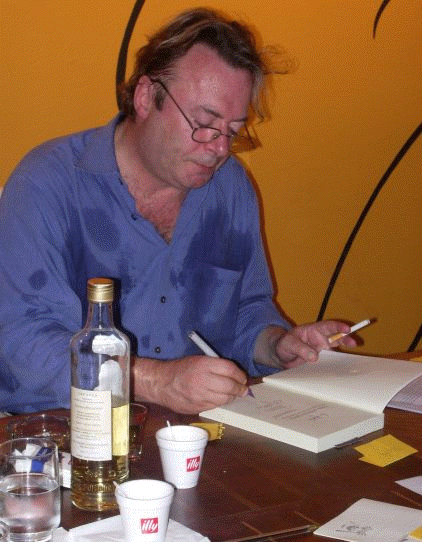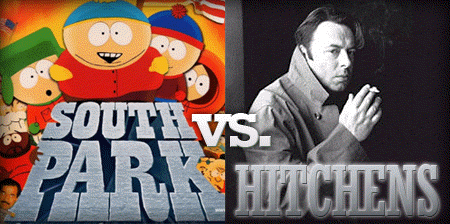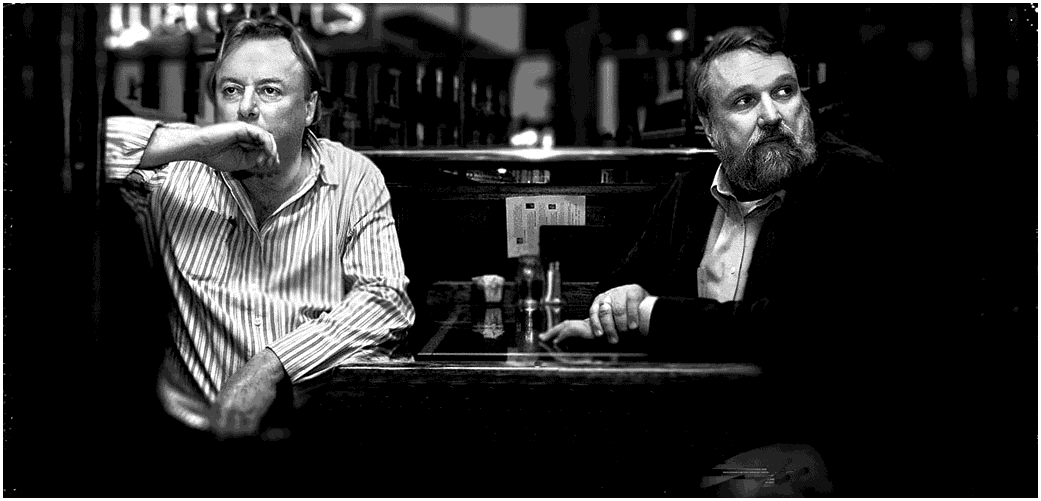A Memoir
Christopher Hitchens
(Twelve, Hachette Book Group)

- Well, we were in a cell that was probably built for six but was holding about sixteen of us. There wasn't much food and we hadn't been given any water for quite a while. The heat was absolutely ferocious. Dysentery had begun to take its toll, which was distinctly disagreeable at such close quarters. Added to this unpleasantness, we could hear one of our number being rather badly beaten by the Japanese guards, with rifle butts it seemed, in their guardroom down the corridor.
At this rather trying moment, one of my young subalterns, who'd managed to fall asleep, started screaming and flailing and yelling. He was shouting: "No, no --- please don't... Not any more, not again. Oh God please!" Hideous noises like that. I had to take a snap decision to prevent panic, so I ordered the sergeant to slap him and wake him up. When he came to, he apologized for being a bore, but brokenly confessed that he'd dreamed he was back at Tonbridge School.
Hitchens and his London companions at a regular Friday lunch --- several journalists and a sprinkling of writers such as Martin Amis, Julian Barnes, Ian McEwan, and Clive James --- used to play dopey word games like the following. They would first replace the word "house" by the word "sock" in various literary allusions, such as Bleak Sock, Heatbreak Sock, and The Fall of the Sock of Usher. Then, similarly replace "man" by "cunt" in, for example, A Cunt for All Seasons and A Cunt's A Cunt for All That. Then, replace "man" by "prong" in such titles as The Prong with the Golden Gun or Our Prong in Havana. Hitchens recounts how, on rare occasions, this sort of puerility rose to the level of high inspiration: "These and other similarly grueling routines had to be rolled around the palate and the tongue many a time before Clive James suddenly exclaimed: 'A Shropshire Cunt, by A. E. Sockprong!'"
In addition to the merriment at this level, the book includes a good deal of useful reportage, simply because in his forty years of hectic journalism and book-writing, Hitchens has been everywhere and met everybody. Name-dropping aside --- Isaiah Berlin, Jorge Luis Borges, Susan Sontag, Ian McEwan, Edward Said, and Salman Rushdie, for example --- are all highly interesting individuals, so it is good to have a close, friendly account of them. Particularly fascinating was the sort of life Rushdie was forced to lead after the Imam Khomeini personally offered a bounty for his murder. Hitchens' account of the response of various writers and intellectuals to the issues created by the Islamic fatwa against Rushdie is illuminating.
Hitchen's reporting is sometimes connected with his own experience of being forced by brute facts to rethink his own positions. A veteran Leftist (member of International Socialists, long-time contributor to The Nation and The New Statesman), Hitch initially opposed the first Gulf War of 1991, in which the first President Bush led an international coalition to reverse Saddam Hussein's blatantly aggressive seizure of Kuwait. After the Iraqi army was driven from Kuwait, the Kurds of northern Iraq and the Shia of the south rebelled against Saddam's sociopathic tyranny, and Hitchens was able to enter Iraqi Kurdistan in the spring of 1991 to report.
- Once I had crossed Turkey and made an illegal entry into northern Iraq at the Habur checkpoint, I entered on a scene that did a bit more than merely change my outlook. The Kurdish provinces of Saddam Hussein's dominion had been turned into a howling wilderness. ...Nothing prepares you for how lush and green the uplands are. Nor could anything have prepared me for the chain of wrecked and gutted and poisoned cities that showed Saddam's unquenchable thirst for destruction: ...village after village and township after township voided of population and then dynamited or bulldozed, while on charred and desolate bits of the landscape ugly blockhouse encampments had been built to "concentrate" the dispossessed. ...The Kurdish city of Halabja had been hit by Iraqi chemical weapons in March of 1988, losing over five thousand of its citizens in just one afternoon. Three years later, it was still possible to interview and to photograph people whose wounds were still burning and suppurating, or whose lungs had been corroded.
Although the rebellion was suppressed in most of Iraq, a part of Iraqi Kurdistan remained in Kurdish rebel hands, protected by the US and British military from reconquest by Saddam.
- This was the closest that the Kurds, the largest population in the world without a state of its own, had come to controlling a piece of the earth that was distinctively theirs. Nor could I help noticing how many red flags were on display, how few mullahs there seemed to be, and how many invocations of old internationalist slogans were to be heard. [Note: Both of the two main Kurdish parties have connections to the Socialist International.] It was chaotic and improvised; ...the atmosphere was somewhat tribal for my taste, but, as Orwell said when analyzing his own mixed feelings about republican and anarchist Catalonia, 'I recognized it at once as a state of affairs worth fighting for.' The idea of 'Reds for Bush' might seem incongruous, but it was a very great deal more wholesome than 'pacifists for Saddam.'"

A few years later, he had to reconsider matters further when he visited Sarajevo "an ancient and civilized town, famous in European history as the site of a tragic drama but also celebrated as a symbiotic meeting place of peoples and cultures and religions...being coldly reduced to shards by drunken gunners on the surrounding hills who sniggeringly represented the primeval hatred of the peasant for the city and the illiterate for the educated."
In Sarajevo, dodging Serbian shells and sniper bullets as the civilian inhabitants had to do for almost four hellish years, Hitch felt rising inside him "an internal yell [that] took the form of a rather simple plea: that the United States Air Force appear in the Bosnian skies and fill with fear and trembling the fat, red, broken-veined faces of the crack Serbian artillerymen who had never until then lost a battle against civilians." And that is just what finally happened, under the leadership of the despicable American President Bill Clinton although, as Hitchens wrote elsewhere, "without the support of the large and consistent anti-war wing of American politics, whose members moaned ceaselessly about quagmire."
By the time of the Islamist mass murders in the USA (in shorthand, 9/11) and later on in London (or 7/7), Hitch had developed a profound distaste for the typical squishy response of Leftists and "progressives," such as the mock breast-beating about "chickens coming home to roost," as if the passengers on the hijacked airplanes and the bombed trains and buses were themselves somehow to blame for being murdered. He commented in a Vanity Fair column on "the utter futility of the soft-centered explanations of the 7/7 bombings and other outrages. It was argued for a while that the 7/7 perpetrators were victims of unemployment and poverty, until their remains were identified and it became clear that most of them came from educated and reasonably well-off backgrounds. The excuses then abruptly switched, and we were asked to believe that it was Tony Blair's policy in Iraq and Afghanistan that motivated the killers. Suppose the latter to be true. It would still be the case that they belong to a movement that hates Jews and Indians and all kuffar, or 'unbelievers:' a fanatical sect that believes itself entitled to use deadly violence at any time."
In the end, these reconsiderations led him to take a dim view of the knee-jerk "anti-war" movement's frantic opposition to the second President Bush's invasion of Iraq to destroy Saddam's regime. It was another case of "pacifists for Saddam," which he sums up as follows: "...about a million liberal-minded people marched through London to oppose the overthrow of a fascist regime." He goes on to comment: "what is 'liberal-minded' about the Muslim Brotherhood and its clone-groups, or about the rump of British Stalinism, or about the purulent sect [he is referring here to British Trotskyists] into which my former comrades of the International Socialists had mutated? To them --- to the organizers and moving spirits of the march in other words --- the very word 'liberal' was a term of contempt."
In short, Hitchens had evolved not into a post-Leftist, but simply into a Liberal, in the sense in which that word was once used in Britain and the US. His position on the forcible overthrow of Saddam does not make him a "neo-conservative" [the spine-chilling anathema conventional Leftists currently pronounce on him], anymore than, for example, siding with the Allies in World War II necessarily makes one a supporter in all respects of Stalin or of the Greek monarchy or of the British Empire.
Hitchens' political evolution is foreshadowed early in the book, when he tells us about his family background. His contemporaries of the Anglo-American baby-boomer Left make it a point to be supercilious about anything military (except Che's and Fidel's dashing guerrilla fatigues), and typically hold a sub-literate, schematic picture of World War II as something vague and pre-historic, like the Trojan War, the voyages of Columbus, or the origin of Spider-Man. But Hitchens is anything but sub-literate, and his father was a stiff-upper-lipped British naval officer who saw no end of action during WWII. Hitch thus grew up with a powerful sense of what was called for (and what was done) in that struggle.
I was rather moved by one reminiscence about his father. "The Commander, who had seen action on his ship HMS Jamaica in almost every maritime theater from the Mediterranean to the Pacific, had had an especially arduous and bitter time escorting convoys to Russia 'over the hump' of Scandinavia to Murmansk and Archangel at a time when the Nazis controlled much of the coast and the air, and on the day after Christmas 1943 ('Boxing Day' as the English call it) proudly participating as the Jamaica pressed home for the kill and fired torpedoes through the hull of one of Hitler's most dangerous warships, the Scharnhorst."
- Sending a Nazi convoy raider to the bottom is a better day's work than any I have ever done, and every year on the anniversary the Commander would allow himself one extra tot of Christmas cheer, or possibly two, which nobody begrudged him. (To this day, I observe the occasion myself.)
